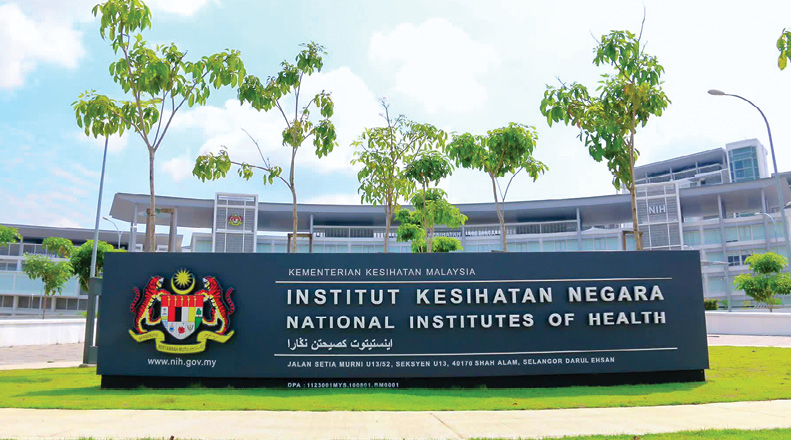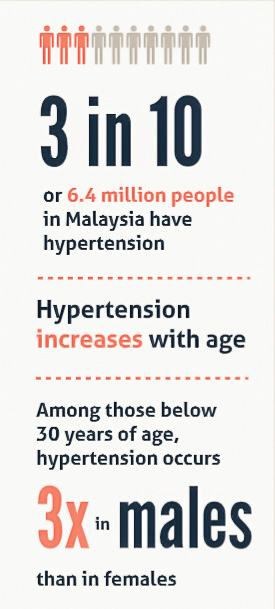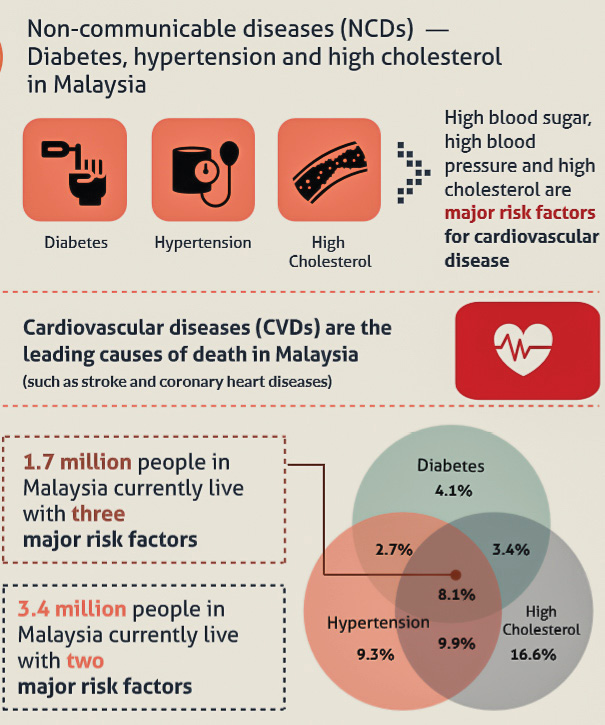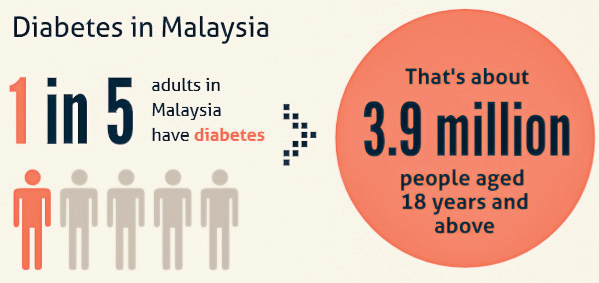Health and medical research provide a bigger picture of public health status, which is key for effective health management and intervention
Health and medical research and development (R&D) have a high value to society. It provides important evidence and information about disease trends and risk factors, treatment outcomes or public health interventions, functional abilities, patterns of care, and healthcare costs.
This real-world evidence and findings aid the Ministry of Health (MoH) in making an informed decision and implementing effective public health interventions. It also influences decision-making and policy development at the federal level.
 The National Institutes of Health (NIH), the research body under the MoH, focuses on conducting health research to support the nation’s public health management. The NIH was approved under the 7th Malaysia Plan and was officially launched in August 2003.
The National Institutes of Health (NIH), the research body under the MoH, focuses on conducting health research to support the nation’s public health management. The NIH was approved under the 7th Malaysia Plan and was officially launched in August 2003.

NIH Manager Dr S Asmaliza Ismail said: “Our research outputs and findings are vital for the ministry, stakeholders and policymakers to make informed decisions and set up interventional healthcare programmes.”
NIH is responsible for carrying out health research, including initial planning and prioritising research areas according to needs, carrying out fieldwork and laboratory work, data collection and analysis, and finally utilising research findings for health services and programmes.
“Malaysia has a large and robust health and medical research capabilities and capacity,” she said.
Research capabilities and capacity
Dr Asmaliza joined the Institute for Medical Research (IMR) in 1995 as a research officer and was roped into the research management committee the following year.
Now as manager of NIH, she concentrates on supporting the NIH’s research institutes in conducting their research.
The NIH’s six research institutes are;
- Institute for Medical Research (IMR)
- Institute for Clinical Research (ICR)
- Institute for Public Health (IKU)
- Institute for Health Systems Research (IHSR)
- Institute for Health Management (IHM)
- Institute for Health Behavioural Research (IPTK)
She explained that each institute under the NIH is responsible for conducting research based on their niche areas such as biomedical, public health and epidemiology, clinical, health systems, health management and governance, and health behavioural.
In tandem with MoH’s aspiration to go digital in healthcare, NIH also recently established a Digital Health Research & Innovation unit under ICR and houses the biomedical engineering research unit.

The NIH has also been charged with conducting training programmes and consultation in health research for the ministry and other agencies in Malaysia and other countries.
“Currently, NIH comprises about 800 technical staff, the officers conducting or implementing research. And we are supported by more than 300 staff in the administrative, IT and engineering departments to maintain our facilities.
She continued: “Apart from NIH, the ministry has research units and divisions within its healthcare facilities.
“Other government research institutes, higher learning institutions and public universities are also conducting research. Large businesses and enterprises in the health and medical sector also have research units.”
She said that R&D is multidisciplinary and cannot work in a silo. “It is a collaborative effort, and NIH actively collaborates with other research institutes and organisations.”
NIH’s research operations and process
The research process at NIH starts with obtaining the approval or clearance to conduct research or studies from the scientific and ethical committees.
This is so that research ethics and moral principles guarantee the validity and credibility of the research. All NIH research complies with national and international guidelines and good clinical practices.
“At NIH, we have developed a guideline for conducting research in MoH facilities and institutions.
“And when any research involves human subjects, whether a clinical trial where investigational medicines or drugs are given to patients, or even having people responding to surveys, we adhere to the Helsinki ethical guidelines.
“Participation has to be voluntary. We cannot coerce, threaten, or entice patients or the public into participating in trials or survey responses.”
She said stakeholder engagement was another key aspect when conducting research. NIH will conduct research on the issues and gaps identified for stakeholders, who want to understand the situation better.
Upon completing the research, before presenting or publishing the results or findings, researchers must obtain approval from the Director-General of Health, the custodian of all the data.
Operations during the Covid-19 pandemic
Like other organisations, NIH was also affected by the lockdowns during the pandemic, shared Dr Asmaliza.
“Most of our operations, research and data collection were on hold. But at the same time, there were also opportunities for NIH to contribute.
“While most research activities were halted, certain vital research, especially those related to the pandemic, were conducted.
“This is because there were a lot of uncertainties surrounding the pandemic, and we needed answers. So, NIH, namely the IMR, ICR and IPTK conducted impactful and comprehensive research during the pandemic.
“For example, IMR was one of the first to identify the best way to handle Covid-19 screenings. Now, post-pandemic, IMR has moved on to Covid-19 genomics surveillance.
“Meanwhile, ICR has conducted a series of surveys on the public’s perception and acceptance, validity, efficacy and safety of the vaccine.”
All findings were presented to policymakers during meetings chaired by the Minister of Health and the Director-General of Health.
NIH’s primary role is research, and Dr Asmaliza informed that all research operations are currently back to normal.
Importance of public health research
Most, if not all, research conducted and produced by NIH has significantly impacted the nation’s public health management.
“The IKU’s primary research focuses on addressing public health issues. The National Health and Morbidity Survey (NHMS) is conducted yearly by IKU, focusing on different public health modules.
“The NHMS reports published capture the public health landscape pertaining to the module. And the research findings can provide key data and information on the particular public health issues and suggest certain policies.”
 Dr Asmaliza said IKU is currently completing the NHMS on the health status of the indigenous people in Peninsular Malaysia, which is the first of its kind. IKU has also embarked on two other NHMS research focusing on adolescent health, and maternal and child health.
Dr Asmaliza said IKU is currently completing the NHMS on the health status of the indigenous people in Peninsular Malaysia, which is the first of its kind. IKU has also embarked on two other NHMS research focusing on adolescent health, and maternal and child health.
Meanwhile, all the six research institutes have also conducted research on public health, looking into issues such as communicable diseases (CDs), non-communicable diseases (NCDs), infectious diseases and even nutritional analysis.
Based on the past and recent research findings and surveys, Dr Asmaliza said: “NCDs are still the most pressing public health issue affecting the Malaysian public, along with obesity. And in recent times, mental health issues seem to be on the rise.
“Malaysians do not practice a healthy lifestyle and diet, which contributes to obesity and presentations of NCDs. We need to empower the Malaysian public on preventative health to avoid the risks of diseases.
“Preventative is always better than curative. We must also remember always to be happy and have a positive outlook.” – The Health









